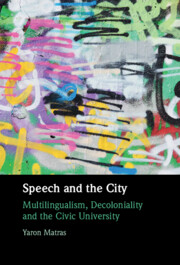Book contents
- Speech and the City
- Speech and the City
- Copyright page
- Dedication
- Contents
- Disclaimer in Regard to Website Content
- Preface
- Acknowledgements
- 1 Linguaphobia
- 2 The City as Multilingual Utopia
- 3 (Re)claiming Knowledge
- 4 Access and Agency
- 5 Heritage and Skills
- 6 Celebration and Citizenship
- 7 Academia and Advocacy
- 8 The Mirage of the Civic University
- References
- Index of Names
- Index of Subjects
2 - The City as Multilingual Utopia
Published online by Cambridge University Press: 23 May 2024
- Speech and the City
- Speech and the City
- Copyright page
- Dedication
- Contents
- Disclaimer in Regard to Website Content
- Preface
- Acknowledgements
- 1 Linguaphobia
- 2 The City as Multilingual Utopia
- 3 (Re)claiming Knowledge
- 4 Access and Agency
- 5 Heritage and Skills
- 6 Celebration and Citizenship
- 7 Academia and Advocacy
- 8 The Mirage of the Civic University
- References
- Index of Names
- Index of Subjects
Summary
Cities are contact zones characterised by conviviality of cultures. They have been described as the ideal setting for multilingual utopias, where institutional spaces emerge that cultivate multilingualism. In the context of globalisation and super-diversity, cities can redefine themselves as post-national spaces. Neoliberalism embraces diversity for its profitablity value; it is opposed by notions of the right to the city and local citizenship. Critical social and sociolinguistic theory embraces definitions of identity, community and language that recognise the dynamics of multiple components in individuals' repertoires of features and networks of practice. Traditional notions of identity, belonging, commuity and language give way to an appreciation of the fluidity of forms of belonging and networking practice. Diasporas are understood as translocal networks of practice with multiple expressions of belonging. Manchester as an early industrial city offers an interesting setting to observe the evolution of diaspora communities and their alignment with fluid language practices.
Keywords
- Type
- Chapter
- Information
- Speech and the CityMultilingualism, Decoloniality and the Civic University, pp. 19 - 40Publisher: Cambridge University PressPrint publication year: 2024

